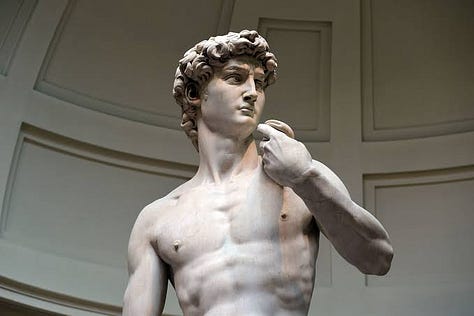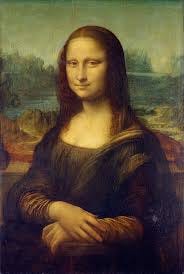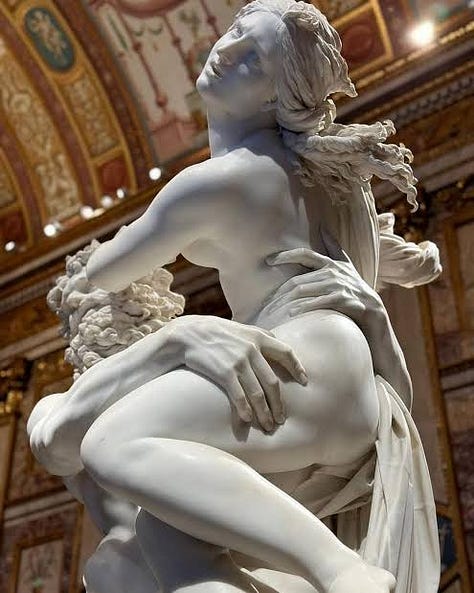OK. I have been fighting to make this perfect. Like, “On Talking to Oneself” by W. H. Gass.
But I am not Gass yet. Gass had to write a lot to be Gass.
So, here …

There is a gift called “thinking with your fingers”.
Not a gift, strictu sensu, like a bowtie-crowned, crispy paper-wrapped present descended from the clouds. I don't think God unfairly distributes gems like these.
I mean gift as in the skill, the craft. The beauty of it. Thinking with your fingers is beautiful because this form of thinking is unnatural and has to be honed patiently.
We all think faster than when we write and, the gulf of seconds between when a thought is rushing like water and you punching those keys is insufferably wide. Thanks to their sheer computing capacity, our squishy brains sift, filter and stir these thoughts in mere milliseconds, before we can even serve them on the page. A lot of spice and heat is lost in the process, you know.
I just admire the people who think in their work—who can create that illusion. Reading their work seems like reading their minds. You can see the trail of their thought: the footpaths are sometimes, scattered like tap dancing in sand. Other times, they are clean like those fine Roman roads cut into rock.
Wasn't it Didion that defined an essay as a "mind in motion"?
They have tamed the erratic beasts of their minds and learned to make them work close together with their fingers—turned their fingers into deft spoons for dishing mind-soup. They have domesticated the vagarities of thought.
The result is both flaming and soothing. Nothing short of amazing.
You can see their soul is swaying, dancing, cooing in every line. Their auras haunt their words, and when you read their works, it’s like you have met the authors, as boisterous and full and interesting as they are in life.

I hear people ask: why do you write, and then pontificate on the "true" purpose of writing. Me, I don’t fault any answers.
Writing is basically a form of human expression. I know it is an important one but unlike much of writer-sphere, I don't ascribe a quasi-religious reverence to it. That's why I divorce any moral quality from the answers.
People can't get past this.
You mean you write for money? That vain incentive? Doesn't it color every word, make them reek of greed? You stink!
I am like, why do you have sex? If you do it because, er, you want a boy-child and you've had five girls, does it make you holier than those neighbors—those unmarried neighbors?
I know you’d gleefully grant them a nice plot in Inferno, but you know what? They'd blame you for the "overpopulation crisis" and poverty and all the societal problems that can be traced to poor parenting.
I really don’t care if you are writing so it can be fed into some LLM1. Or if you are doing it because you are bored.
I am doing it because I can. I can write so I do it. No angel roused me and whispered these words into my ear (you can bet this is not the kind of stuff an angel would say)
But my reason is more than because I can. Forgive me. It should be more. It has to be. I can take a bus to Ogun State. I absolutely can. So why am I not in Abeokuta now?
I write because I don’t want to die. I am afraid of death. I am scared to death, of death. I am a vain megalomaniac who is obsessed with immortality.

Many people believe death is an illusion—that at death, you really don't end.
You most probably got that from your religion. If you grew up like me, it’s either aurelian utopia in Heaven or unimaginable torture in Hell at the end of this life. Both are for forever, which is a time-frame like trillions of years raised to the power of trillions of years.
Well, this figure is plain wrong because numbers are just contradictory to the concept of eternity—because numbering is measuring.
Eternity is spitting in your face and telling you point-black that it is impossible to measure, to number.
My religious beliefs have been reshaped in major ways. I don't live a ridiculously high-stakes life, the consequences of my actions placed on the steep ends of never-ending utopia or dystopia. I don't believe in an inextinguishable, raging "lake of fire" scorching people for eternity.
I also don't believe death is an illusion.
Death is what it is. Death is as real as life. It is painful and hurtful but, pipedreams about gold streets is just false hope and doesn’t help anyone.
OK, it does help, to help one cope with the grief: I just lost an Aunt who was close to our hearts and I need that succour. I need that "she's in a better place" feel-good pill. But I am a man who prefers to be troubled by the truth than cushioned by a lie.
I write because the day my heart stops, it all ends.
My loves, my craves, my greed. My hates, my lust, my needs. Me. Everything. This clumped-up maze of interestingness. This complex mass of cells, this godhood-obsessed, beauty-lusting existence. All of it. Whiff!
Gone.
Life is like a plume of smoke. Present and pungent. Proud when it’s there. But tomorrow, all that’s left is maybe, the ashes from where it rose. Its billowing braggadocio is erased away and there is no sign. Smoke is like air so it doesn't leave a dent in the sky.
Old Testament writers were well-acquainted with this, this ephemerality of life. Life was breath; vapour. How flourishing our lives can be. How they can mean so much, take up chunks of space in reality. How so gone they are, the next day.

My stomach is squeezing now but I won’t stop typing about how I write because I have not believed in a Heaven for myself.
I don't imagine an ethereal bliss at the end of all this. All I hope for is for some humans, these routinely ungrateful, amnesiac humans, to remember me.
Wishful? Vain?
I write to pour myself out over a neat web of machines called the internet, so that when my body decays, these plastic-and-glass things would preserve me—like an Egyptian mummy—preserve my caged words, keep me alive.
Any second that someone reads what I wrote, as I speak inside their heads, I’d be living again.
That's why I want to be a full person, to love, to hate, to curse, to live in these letters.
The world is choking up on the weight of words, the more books we publish and we may veer off our orbit around the sun. But I am here praying to stand out somehow, to have someone resurrect me again, and another, and another.
Wishful? Vain?
For how long would I live in my self-contrived heaven? I don't know. A hundred years? A thousand? Million? Billion?
If we delay a nuclear holocaust by a thousand years, thank God. If we never have one, I bet in a million years, humans and society would change so fundamentally that I’d be some kind of proto-human and my rantings would be a child's doodling on cheap toilet paper. Meaningless.
I am praying to live somehow. To have this intangible, immaterial part of me live here longer than me. I want to die happy—die knowing I have left something behind. That my name is carved in rock. That I have given civilization something it'd cherish, something that makes the world better and more beautiful.
I am praying that I will not be forgotten. That is the real death. Who was it that said that a man only dies when his relatives stop talking about him?

Dead men rule the world. The thrones of the world are in the grave. The Platos and Newtons and Montaignes and Darwins and Shakespeares and Da Vincis of this world do not languish in scorching flames. Are all really equal in death?
Because our adoration would surely purge these great men of their sins. Every day we light fires at their tombs, and burn incense without knowing.
Every election, every parliamentary seating, every democratic policy is a nod to Baron de Montesquieu and Lincoln and Hobbes and Dicey and more.
Every essay is Montaigne wearing robes and strutting on a red carpet. Every new flashy supercar is Benz showing off. Every book is Gutenberg drunk with pride. Think of this. Selah.
I am praying to join them on Mount Olympus, as they sit on hilltop thrones, their bare toes impressed in the annals of history, straddling the reality of their once-mortal existences and their now-earned immortality: their names emblazoned on the summits of our cherished and prestigious civilization.
They are the saints of my religion so I worship at their feet. Their biographies are my scripture. Their birthdays and the days they did great things, holy days.
I do rituals. I make prayers. I study them like Catechism or the Bible at Mass.
I want to go to Heaven.
It is so much easier to pray for this Heaven, because the opposite, a Hell of invisibility, of a life unfelt, to live and not give back and leave a better world behind, is worse than sulphur and brimstone.

What can I do? It'd take me to empty myself as completely as I can. Embarrassment and shame are meaningless in the vastness of time.
It'd take me to swear against hoarding. To give all. To die empty. To toil for excellence. To do everything well, and then do everything differently. And then give all. Again and again.
To wring out my soul on the pages of time.
Here is the image of the nude sculptor chiseling away at a huge slab of marble, transforming cold lifeless rock into divine forms of life, frozen in time. Sculptures like Michelangelo's David breathe. The Abduction of Prosephina would surely bleed if you put a blade to her fair thigh. Mona Lisa would pout if you don’t smile back. She may weep if you cuss at her.



These are living works. They are alive because their makers breathed soul into them as God gave Adam the Breath of Life.
Those living-dead great men stripped themselves to clothe their works in grandeur, and in glory.
This nakedness is the sacrifice I must make, this is the pain I must gladly take; for narrow is the path that leads to everlasting life.
Am I not ascribing “quasi-religious reverence” to writing now? If writing is but a means to achieve my raison d’etre, my reason for being, doesn't this make writing the chief devotion of my life? what else is a religion?
With love & ink,
Emmanuel
LLMs (Large Language Models) are the huge repositories of text that AI like ChatGPT generate from.




thank you for your kind words, brother
I don’t have any word to describe how I felt reading this.
I felt seen, of course, but saying that feels inadequate. It fails to capture the essence of this essay, and its impact.
This is the sort of thing you write as a manifesto to convert people into a movement that threatens the established order.
Magnificent work, as always, Emmanuel.
“I just admire the people who think in their work—who can create that illusion. Reading their work seems like reading their minds. You can see the trail of their thought: the footpaths are sometimes, scattered like tap dancing in sand. Other times, they are clean like those fine Roman roads cut into rock.” This part, this is exactly how I wish to write.